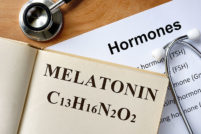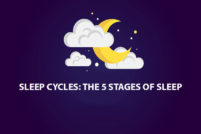Melatonin is a common supplement in many households and most people with sleep conditions have turned to melatonin at one time or another in hopes of finding the perfect, all-natural solution for their insomnia. Widely thought of as a harmless hormone our body already produces, melatonin is a trusted but often misunderstood supplement and many people either take it at the wrong time or are taking the wrong amount.
Melatonin use among adults in the US more than doubled between 2007 and 2012, so it’s no surprise that parents are often turning to it to help their kids sleep, too. After all, it seems to be much safer than a sleeping pill, it has no addictive properties and it’s natural, right? Not only that, but melatonin has been reported to help children with ADHD, autism and even teenagers who are staying up all night.
There is a lot of confusion out there about melatonin and even more so when it comes to whether or not we should give it to our children, so in order to dispel some of the myths and sort through some of the information, we’ve compiled the 5 things you should know before you give your kid melatonin. Keep reading and be better informed.
1. Melatonin isn’t technically meant for children
While people certainly are giving their children melatonin and many report positive results, you’ll notice that most dosage information mentions adults only and not the recommended dosage for children. This is because there simply isn’t very much information out there on the effects of melatonin on children.
While it can be an effective sleep aid and many children use it without any reported side effects, little is known about its long-term effects on forming brains. And, since melatonin is a hormone, it is also not known to what extent it will affect or impact your child’s hormonal development during puberty.
Carl Cummings, a paediatrician in Montreal, who has researched the effect of melatonin in kids with chronic insomnia, believes it could be helpful. But, as he clarifies, the problem is, “if you look at the number of studies and the number of subjects in the studies, they are actually quite small numbers. So, it’s reassuring, but only to a point.”
2. Melatonin isn’t regulated
As we mentioned above, there aren’t many studies done on the long-term effects of melatonin on children’s developing brains. But why? If there is evidence to suggest that melatonin could help children with sleep issues, why don’t we know more about it? The answer simply lies in the fact that, currently, the FDA does not consider melatonin a pharmaceutical, but rather a supplement, and so there are no big-name pharmaceutical companies bankrolling any large studies. Instead, it is considered much like a vitamin or herbal remedy and so the FDA cannot vouch for its safety or efficacy on anyone, let alone children.
Because of this, there is varying information out there as to how much both adults and children should take, how often and for how long. There is melatonin that is synthetic and melatonin that is derived from animals and no regulations that say that companies have to disclose where and how they got the hormone. These are all things you might want to consider before giving your child melatonin.
3. Melatonin might help your child with ADD/ADHD or autism
Despite the warnings given by certain health officials, there are plenty of parents out there and even doctors who feel that melatonin is not only harmless to children but that it can help with certain disorders, such as ADD/ADHD or autism.
Children with these conditions can often have problems sleeping, both with sleep duration and with sleep interruption, which can exacerbate the behavioural issues that can accompany these disorders. Some parents have found that melatonin has helped their children sleep without needing a pharmaceutical level sleep aid.
One four-week study, on a total of 105 children, ages six to 12 years old with ADHD and chronic insomnia, reported that melatonin use did have a moderate effect on the amount of sleep, as well as on the sleep patterns of their test subjects. It, however, did not show that it had any significant effect on behaviour or quality of life. There were no reported adverse side effects on the children from taking the higher dose given in the study, which was between 3 and 6 milligrams.
What is also important to note is that the results varied from child to child and depended on things such as body weight and age of the child, as well as the severity of the sleep issues. Dr Cummings, mentioned above, also notes that if you get to the point where you want to take your child off melatonin, that there is a “high relapse rate” and that “once you take your kid off melatonin, they are almost guaranteed to go back to having difficulty sleeping.”

4. You can raise your child’s melatonin levels naturally
As we already know, melatonin is a hormone released by the pineal gland in the brain and it is regulated by daylight and darkness and connected to the natural circadian rhythm of our bodies, which tells us when to wake up and when to sleep. Just like with adults, there are some things we can do to ensure our kids are getting the best chance for natural peak melatonin production, so they don’t need to turn to a supplement.
Blue light emitted by devices at night can be keeping your child awake and more and more children are using handheld devices in bed before they go to sleep. This tricks the body into thinking it is still daylight and decreases the natural production of melatonin in the brain.
If you want to raise your child’s melatonin naturally, the best thing you can do is limit or eliminate the use of phones or tablets in bed. Better yet, reduce screen time including TV in the hour before bed, so that their body knows it’s time to sleep.
Children who watch TV or play video games before bed were reported to sleep at least 30 minutes less than those who did not and kids who used their phones or computer before bed slept, on average, an hour less.
5. Melatonin shouldn’t be a Band-Aid solution for bad sleep habits
Above all, melatonin should not be used as a Band-Aid to mask bad sleep habits that could otherwise be solved naturally for your child. While there is not a lot of evidence to suggest that there are many side effects for children using melatonin, there is also not a lot known about its long-term effects and so a natural choice should always be made, where possible.
If you know that your child could use a more consistent bedtime and that you can help them make improvements to their night time routine, by limiting screen time, meals or snacks before bed and promoting relaxing activities, like a warm bath or reading, you may find that your child’s sleep improves without the use of a supplement. Most of the times, good sleep hygiene and an emphasis on routine will fix most children’s sleep problems.
Final Thoughts
Informed decisions are the best decisions when it comes to what we do for our children’s health and, until there are more studies on melatonin and its use on children, we should proceed with caution. That isn’t to say that means not using melatonin at all, but instead to keep abreast of new evidence and research and to realize that not all children are the same and that supplements, no matter your age, affect everyone differently.





